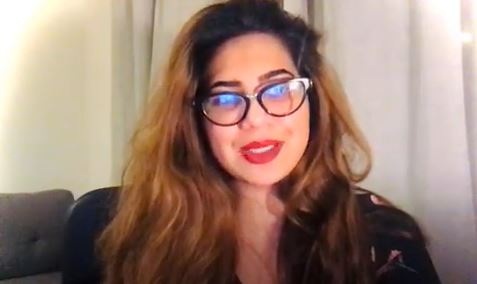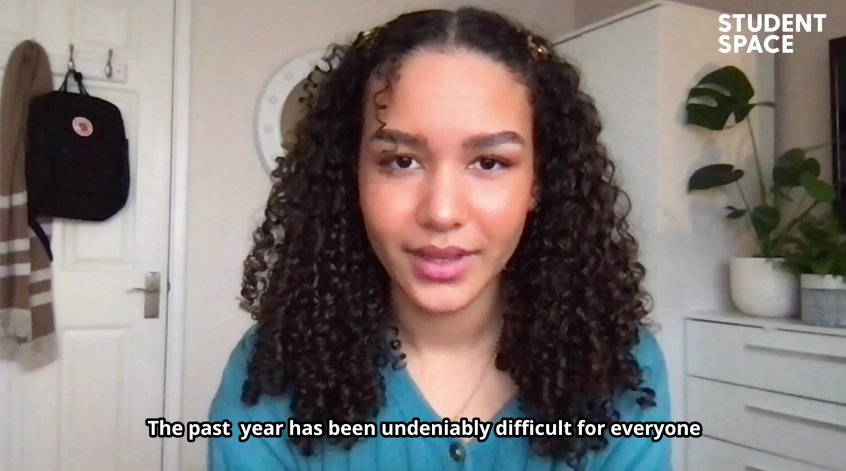Managing OCD during the pandemic
Jess describes her OCD, including how her intrusive thoughts focus on germs, contamination and illness. When the pandemic started, it became harder to diffuse her intrusive thoughts, and her mental health declined. She explains how she sought support, and some of the things she does to help her cope.
Jess talks about how the pandemic has affected her OCD (Obsessive Compulsive Disorder) and explains some of the things that have helped her to cope.
- Video transcript
Hi, my name is Jess, I'm 20 and I just finished my second year of university. Today I'll be talking about my experience with the pandemic and how it's affected my mental health, and more specifically my OCD.
I view my OCD as an overprotective but rather unhelpful voice in my head, which makes me feel extra responsible for the consequences of my actions. I feel compelled to carry out certain behaviours to remove, cancel out or neutralize a bad intrusive thought. For example, I may have the thought, if you don't do this behaviour, then something bad will happen to me or a loved one, and I will be responsible for it. The OCD behaviours are carried out to relieve my anxiety. However, the more I gave into the intrusive thoughts, the more powerful and the more frequent the OCD voice became.
Since my OCD stemmed from emetophobia, which is the fear of sick, my intrusive thoughts around the topic of illness and contamination. But an important moment for me in my journey to recovery was realizing that these threats to my health and the health of those around me were often not real, even though the anxiety and the distress of all was very much real. Therefore, over the past few years, I've been able to rationalize whether the intrusive thoughts were legitimate threats or not, which really helped my OCD voice to quieten down and not be as distressing.
Then unfortunately, a COVID-19 pandemic happens, I felt as though my many years of progress had gone down the drain, because suddenly, I was listening to my OCD voice again, and acting on my intrusive thoughts more often. Because understandably, my anxiety levels were really high. My fear of contamination and germs and spreading of illness crept to the surface again, and I essentially felt like a prisoner to my OCD for the first time in years.
During the pandemic, the threats, which I could quite easily diffuse as mere thoughts before, became real. If I didn't wash my hands thoroughly or a certain number of times, then it really felt like there was an actual chance that I could spread the virus to either my loved ones or someone else's loved ones, and contribute to the deaths. This meant that I gave into my compulsions much more often than I was doing before the pandemic to temporarily relieve my anxiety and my distress. However, this only made the OCD more powerful and debilitating for me.
Undoubtedly, this had a major negative impact on my relationships with those around me. It prevented me from socializing due to my fear of exposure to strangers and friends, and their germs. And it also impacted upon my university work and grades and damaged my self esteem in general.
However, a huge turning point for me was when I became aware of this, and I recognized that I was slipping into a negative mindset once again. I reached out to my GP, and they referred me to NHS cognitive behavioural therapy (CBT).
I also made an appointment with a well being service within my university, where they suggested that I have something called an individual learning plan. This plan allows me to receive extensions from my assignments and have rest breaks during my exams. And this is really useful because the exam period is super anxiety-inducing for me. I was told that this plan wasn't going to give me an unfair advantage over my peers, but rather it was going to put me on a level playing field due to my ongoing mental struggles.
Other things that have helped me to cope during the pandemic have been creative things, as I find that it calms my anxiety, such as painting and also being outside in nature and just breathing in fresh air. I've also learned to be a lot more self compassionate, and try and stop beating myself up as much about my OCD. I've managed to achieve this through meditation and yoga, and just taking time off whenever I feel like it is getting too much.
And finally, talking to someone. Whether it's a family member, a friend or someone who works for a charity, like Samaritans or OCD Action, voicing a struggle can be really cathartic and can just help you to process all your emotions and feelings. If you take anything away from this video, please let it be that you are not defined by our thoughts and there is support out there. There is no shame in reaching out for help. And the future is bright and it will get better.

Find support
See what support is available at your university




